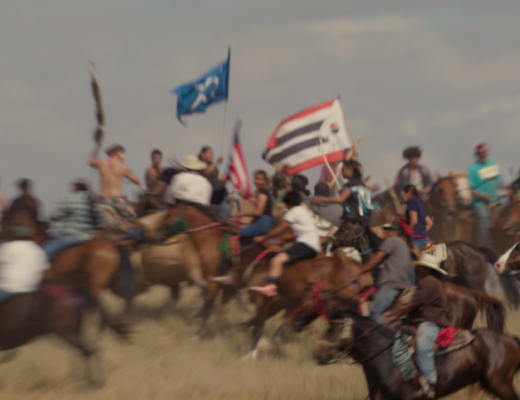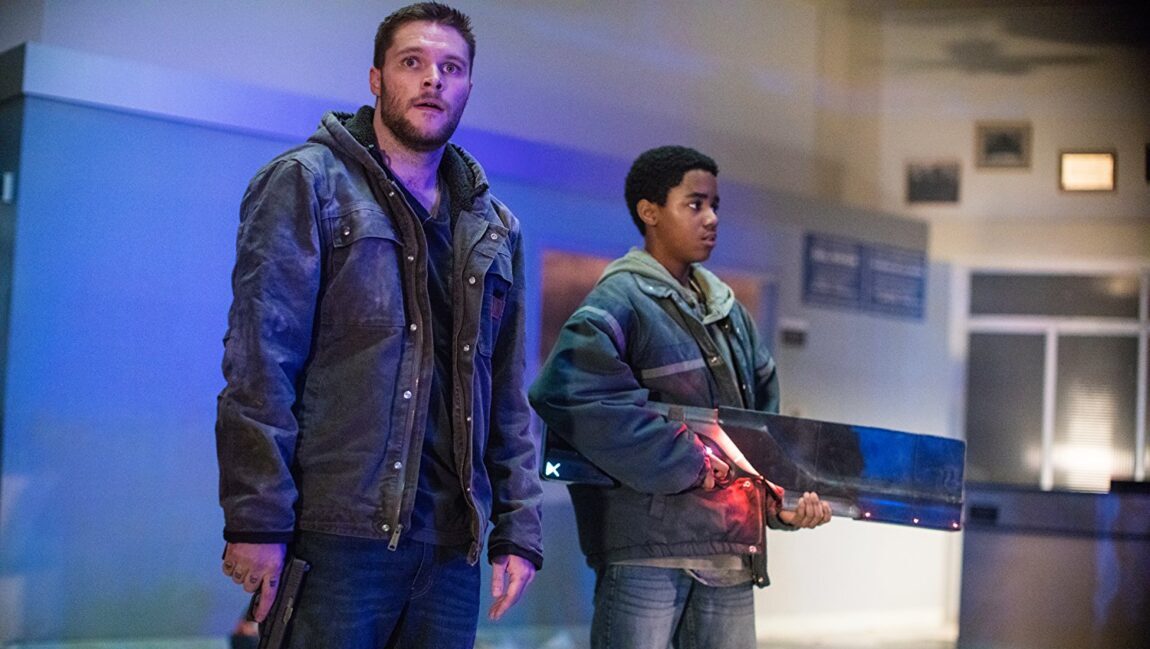With The Monk the Gun, director Pawo Choyning Dorji makes sure that viewers are fully aware of the film’s context by providing a barrage of exposition within the film’s first five minutes: it’s set in Bhutan circa 2006, the country having recently entered into the digital age with its population gaining access to TV and the Internet; the incumbent king has devolved power in favor of a democratic republic; and to teach the rural populace how about democracy and voting, the government holds a mock election. While this flurry of information at the start might lend the impression that the film is going to riddled with confusing political jargon, it instead persists as a relatively simple drama that, whilst being fundamentally about the political development of Bhutan, is more about the individuals living in rural villages and the bustling cities and their reaction to the ever-shifting political landscape around them.
Another major plot point, and where the film gains its rather mysterious title, comes from the village’s local Lama. After hearing a radio broadcast about his country’s progression into democracy, he decides that something must be done to make things right, subsequently ordering his young apprentice to find two guns. It’s an ominous scene, with the camera fixed at the back of the Lama’s meditation room obscuring his face and drenching the scene in low light. Dorji keeps the ambiguities about the Lama’s intentions high, insinuating that political violence is intended, but never revealing more than a few breadcrumbs about what is to come. This suggestion, however, is largely played as farce, and feels like a jab at Western audiences who can’t possibly imagine anything other than violence to come from this circumstance. The gun that his apprentice eventually finds, an ancient American Civil War-era rifle, is also lusted after by a mysterious American who is willing to spend large sums of money for it; this setup also allows as a bountiful resource for humorous commentary about America’s obsession with firearms and incomprehensible the fixation is to other cultures.
The film’s weaker aspects come from its more dramatic beats, which take a far more sentimental approach than the low-key satire found elsewhere. Most of this stems from one family, where the father is an aide to the political candidate (for the real elections) who represents a break from the past at large and industrialization specifically (although the film never really expands on these ideas more than using them as distinctive buzzwords). This is much to the chagrin of his wife, who works for the election committee, and whose mother is a deeply traditional and conservative woman, with the rift between her and her son-in-law becoming so wide they refuse to speak to each other. Of course, this takes a heavy toll on the relationship between husband and the wife, with the latter taking the view that they shouldn’t let politics disrupt their family, questioning if it is even worth it — a strangely conservative subplot to give to a female character in a film exploring political freedoms.
Perhaps predictably, another conflict here is the age-old one between tradition and progress. At one point, the election committee, who are educating the villagers, stages a mock debate, which eventually collapses into mindless shouting about nothing more than how each side hates the other. One villager expresses her shock and horror at these scenes: “Why are you turning us into rude people?” she asks the members of the election committee. The initial gambit of trying to teach people how to debate, when they don’t even know what they are debating about, is genuinely humorous; however, it feels Dorji is attempting to make rudimentary neoliberal commentary on how modern (most notably American) politics has turned into nothing more than a blind shouting match full of rude people: an empty discursive line which feels like it was lifted from a corporate Democrats handbook.
The Monk and the Gun has already garnered comparisons to American master Robert Altman, and while these are not totally unfounded claims — the film fixes its attention on a large ensemble rather than a clear central protagonist and offers a humanistic yet subtlety satirical survey of place in time — the collation does the film no favors, leaving it to feel like a far more diluted version of the auteur’s work by contrast. Dorji no doubt has some strong ideas sprinkled throughout, most notably with regard to its depiction of the creeping West’s influence on local culture: villagers watching James Bond on TV, or a government worker comically asking the morally dubious American character for advice on democracy. But even this never feels as substantial as it should, and certainly not as much as films like Jia Zhangke’s Unknown Pleasures muster, which highlights the tangible malaise of living in a country being pulled simultaneously by antipodal forces.
So while the film is certainly humorous throughout – most notably when it’s following the farcical antics of the monks and the American — the satire is never biting enough to actually make any decisive statement on the notions of democracy, capitalism, and whether the people of Bhutan actually need either. Instead, it renders the politics of it all as incredibly simplistic — which feels like wasted potential given the promising setup and successful comedy — allowing the film’s more dramatic elements to frequently take center stage, to its detriment. Despite its shortcomings, there’s no denying the appeal of a gentle ensemble drama like this that manages to consistently engage, and Dorji organizes all of the film’s disparate narrative threads to coalesce in the end, bringing about a decisive and well-earned finale. But for much of the runtime before this, The Monk and the Gun merely toes the edges of its concept and rarely makes any scathing jabs at the systems it’s attempting to dissect and/or send up, leaving something that feels too purposefully and blandly uncontroversial to fully edify.
DIRECTOR: Pawo Choyning Dorji; CAST: Harry Einhorn, Tandin Wangchuk, Deki Lhamo; DISTRIBUTOR: Roadside Attractions; IN THEATERS: February 9; RUNTIME: 1 hr. 47 min.







